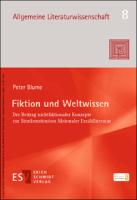Fiktion und Weltwissen
Der Beitrag nichtfiktionaler Konzepte zur Sinnkonstitution fiktionaler Erzählliteratur
Author(s)
Blume, Peter
Collection
Knowledge Unlatched (KU)Language
GermanAbstract
Fiktion und Wirklichkeit – von diesem Begriffspaar ist die literaturwissenschaftliche Fiktionalitätsdebatte traditionell geprägt. Auffallend bleibt dabei jedoch ein Widerspruch zwischen Literaturtheorie und der Praxis der Textanalyse. Denn was den „Realien“ aus literaturästhetischen Erwägungen häufig abgesprochen wird, bestätigt indirekt die Interpretationspraxis: die Wichtigkeit nichtfiktionaler Elemente für das Textverständnis. Mit der vorliegenden Studie wird der Versuch unternommen, die Dichotomie von Fiktion und Wirklichkeit aufzugeben zugunsten eines Modells, das dem kognitiven Charakter sprachlicher Bedeutungen Rechnung trägt und es so ermöglicht, der Funktion nichtfiktionaler Konzepte als Orientierungspunkte bei der Sinnkonstitution fiktionaler Erzähltexte gerecht zu werden. Dabei werden Ergebnisse der kognitiven Semantik für die Literaturwissenschaft fruchtbar gemacht, um ein neues theoretisches Fundament zur Differenzierung zwischen fiktionalen und nichtfiktionalen Teilen fiktionaler Erzählliteratur zu schaffen. Eine textnahe Typologie der Verwendungsweisen nichtfiktionaler Elemente sowie ausführliche Fallstudien zu Texten von so unterschiedlichen Autoren wie Uwe Johnson, Christoph Ransmayr und Lewis Carroll verankern die theoretischen Überlegungen in der konkreten Textanalyse.
Fiction and reality - this dualism has traditionally shaped the debate on fictionality in literary studies. What remains striking, however, is a contradiction between literary theory and the practice of textual analysis. For what is often denied to “realia” for reasons of literary aesthetics, indirectly confirms the practice of interpretation: the importance of non-fictional elements for the understanding of a text. This study attempts to abandon the dichotomy of fiction and reality in favour of a model that takes into account the cognitive character of linguistic meanings. Thus, the model makes it possible to take account of the function of non-fictional concepts as points of reference in the constitution of meaning in fictional narrative texts. The results of cognitive semantics will be made fruitful for literary studies: a new theoretical foundation is established in order to differentiate between fictional and non-fictional parts of fictional narrative literature. A Typology of the different ways in which non-fictional elements are used is established, and detailed case studies of texts by authors as diverse as Uwe Johnson, Christoph Ransmayr and Lewis Carroll anchor the theoretical considerations in concrete textual analyses.


 Download
Download